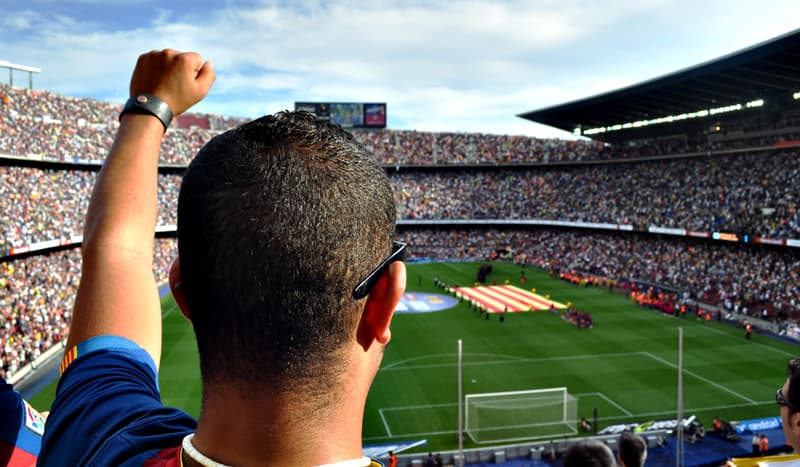Fastest FA Cup Goal

Want to know who and when the fastest goal in the FA Cup final was scored? We have the answer along with some other trivia about the World's most famous knock out cup competition.
When all four semi-finalists of an FA Cup come from the top division, it was set to be a gripping final. Though it did not disappoint, this time the underdogs did not prevail. The 128th FA Cup in 2008-2009 is noted for having the fastest goal in FA Cup history.
The Beautiful Game
The FA Cup is widely considered one of the most captivating competitions in British, if not world, football. All those that have experienced the competition either as a player or as a fan will undoubtedly agree that it has a certain intangible magic.
This is perhaps owed to its long history and tradition, or the construction of the competition that allows the minnows of the game to try their luck against the highly experienced sharks of the big league. In the year of its inception, season 1871-72, The FA Cup had a mere fifteen entries.
The 2008-2009 FA Cup
Skip to 2008-2009 and a record 762 teams entered, including 43 new entrants, perhaps unsurprising considering the prize money up for grabs rose from £9.7m in 2007-08 to £16.4m this season.
With some big wins in the extra preliminary rounds, and numerous upsets along the way, such as Nottingham Forest’s 3-0 victory over Manchester City in the third round, this year’s 128th FA Cup was as thrilling as ever.
Unlike the 2007-08 Semi-Finals, when three of the four teams were from outside the top division, all four of this year’s Semi-Finalists were from the top, with Chelsea, Arsenal, Manchester United and Everton all battling it out for the Cup. In fact, the only team in the final eight that were not from the Premier League was Coventry City, who reined victorious in 1987. Wembley Stadium hosted both Semi-Finals, the second time it has done so since it was re-opened, and it was Chelsea who beat Arsenal 2-1, followed by a surprising upset that saw Everton beat clear favourites Manchester United.
The 128th FA Cup Final - Chelsea Vs Everton
After a 2-1 victory over Everton in the final on May 30 Chelsea had secured their second FA Cup success in the last three years and ended the campaign of a team that were fierce contenders throughout, but who hold the unenviable title of losing seven FA Cup finals; the most of any team in the Cup’s history.
The match was sparked into life within 25 seconds when Toffees’ forward, Louis Saha, drove home a Marouane Fellaini knock-down to score the quickest goal in Cup Final history.Everton fans dared to entertain the thought, perhaps only for a moment, that they could take on and beat one of the strongest team’s in football history, but it was not to be and Saha’s goal was answered in the 21st minute of the game by Didier Drogba, who further ignited some magic in Frank Lampard who sealed victory for Chelsea in the second half.
Interim coach Guus Hiddink left Chelsea with the perfect goodbye gift to return to his full-time role as coach of Russia and football fans worldwide are left with a long, and perhaps for some antagonising, wait for next year’s FA Cup.
You Might Like
The Davis Cup
In tennis, The Davis Cup is actually the biggest team competition in the world.How did it get to this from a humble competition between the USA and Great Britain?A Guide To The Rugby World Cup
Check out our simple Rugby world cup guide to see past winners as well as scores for all games since it's inception in 1987.The History Of The Ashes
With a new Ashes series about to start in Australia we explore what the history of the Ashes is and why it matters so much.A Brief History Of Online Lending
From credit cards to loans and mortgages, read our brief history of online lending to see how quickly things have progressed.Football World Cup Betting Made Simple
Once every 4 years you get to pit your knowledge of the beautiful game against bookmakers in order to win big.
Useful Websites
- JD Sportswear
Now a sports fashion retailer, they provide sports clothes for men, women and children. Owners of brands like Kukri, Cabrini and Kooga they cover rugby, football and of course outdoor fashion. - The Soccer Store
We are one of the UKs leading suppliers of football goals and football equipment supplying to clubs, schools and individuals. - Sports Leisurewear
Football team kits at cheap prices. With a range of football kits, sports gear and leisurewear look for all the brands now on our website. - Discount Football Kits
Discount Football Kits are the UK's leading supplier of Nike, Prostar, Adidas and Stanno football team kits at discount prices. Also football equipment, balls, goal posts, goalkeeper kit, tracksuits - Clubline Football
UK based football equipment supplier offers a full range of branded football team kits and training gear including Nike team strips, Mitre footballs and Prostar football wear. - Golf and other Sporting Holidays from Your Sporting Challenge
Offer holidays to golf and other sporting holidays throughout the World, including football, rugby, cricket and more. - Add Your Website Here